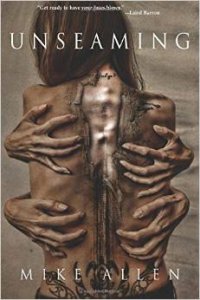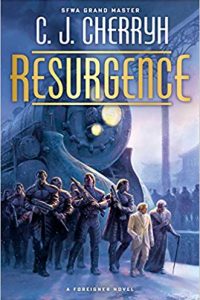Stefan Dziemianowicz reviews Mike Allen
Unseaming, Mike Allen (Antimatter Press 978-0-9889124-1-0, $15.95, 224pp, tp) October 2014.
 In ‘‘Monster’’, the final story in Mike Allen’s collection Unseaming, a self-described monster describes the reality of the world he inhabits in terms of ‘‘the possibilities of curves that are infinite in length, even though they occupy a finite space,’’ and ‘‘a universe that can contain infinitely many things within its borders, and yet outside be no larger than this table.’’ This sort of ‘‘Escher landscape,’’ as he refers to it, reveals itself in most of the book’s stories. Their characters move in a world of seemingly stable reality, only to discover that, as a character in one story thinks of it, ‘‘the pylons of reality have ripped free of the ocean floor,’’ pitching them into a realm of surreal and horrific possibilities.
In ‘‘Monster’’, the final story in Mike Allen’s collection Unseaming, a self-described monster describes the reality of the world he inhabits in terms of ‘‘the possibilities of curves that are infinite in length, even though they occupy a finite space,’’ and ‘‘a universe that can contain infinitely many things within its borders, and yet outside be no larger than this table.’’ This sort of ‘‘Escher landscape,’’ as he refers to it, reveals itself in most of the book’s stories. Their characters move in a world of seemingly stable reality, only to discover that, as a character in one story thinks of it, ‘‘the pylons of reality have ripped free of the ocean floor,’’ pitching them into a realm of surreal and horrific possibilities.
In ‘‘Gutter’’, an investigative reporter trying to expose police negligence in their handling of a crime-ridden alleyway, discovers that its victims are part of a greater scheme to propitiate the terrible entities ‘‘who really run the show.’’ ‘‘The Hiker’s Tale’’ is set in a rural landscape where a seam between realities opens to draw unsuspecting victims in and let horrifying abominations out. In ‘‘Humpty’’, a man who remembers his childhood nightmares of a stuffed doll that terrified him discovers that the doll has a sinister hold on him in his adult life. A number of these tales open with characters already trapped in a fractured reality, striving desperately to keep their lives under control. In ‘‘The Blessed Days’’, everyone in the world wakes up one morning to find themselves drenched in blood. The cosmic vision vouchsafed to the story’s protagonist when he experiments with lucid dreaming is a nightmare straight out of Lovecraft. ‘‘Her Acres of Pastoral Playground’’, whose characters spontaneously mutate into tentacled monsters, was actually written for an anthology of Lovecraftian horror stories.
Several of Allen’s stories have the sensibility of dark fairy and folktales. At ‘‘The Music of Bremen’’ farm, invaders of a witchy old woman’s home are subject to the same fate that befell the robbers in the Grimm’s fairy tale ‘‘The Bremen Town-Musicians’’. ‘‘Stone Flowers’’ tells of an artist who sought approval for his work from the fabled Queen of the Copper Mountain, and wound up in a bargain that sacrifices the future happiness of him and his family. A pair of interconnected stories wrap around the majority of the contents. In the title tale, a nominee for the Nebula Award, a young man’s quest to find a beloved niece who disappeared into drugs and dissipation, eventually vanishing, leads him to the shop of a mysterious merchant who reveals himself to be not of this world. Years later, in ‘‘The Quiltmaker’’, that young man returns home, traumatized by his experience and inflicting the transformation it has wrought in him on others in his neighborhood.
Allen can write as lyrically and as viscerally as the best of them, sometimes in the same paragraph. This is how he describes a monster that manifests in ‘‘The Hiker’s Tale’’: ‘‘Wicked hooks of bone protruded at every joint from a hide like layers upon layers of burn scars. The pulpy mound of its head spilled over its chest and shoulders in a cascade of sucking mouths and writhing eyestalks. Spined organs that had to be genitalia jutted from its abdomen like tusks.’’ In ‘‘Condolences’’, a woman experiences overwhelming grief as an alien sound that merits this remarkable passage of descriptive synaesthesia: ‘‘She could only frame it in terms of the pictures that formed as the noise tore her mind open. A dead body dried to paper in a pit of scorching sand. A crack in the floor of the ocean where no lava burned, no sea worms bred, colder than absolute zero. A space outside the universe where no light would ever reach.’’ This is an exceptional debut collection, and its stories show an imaginative writer with a very original voice working at the top of his game.







